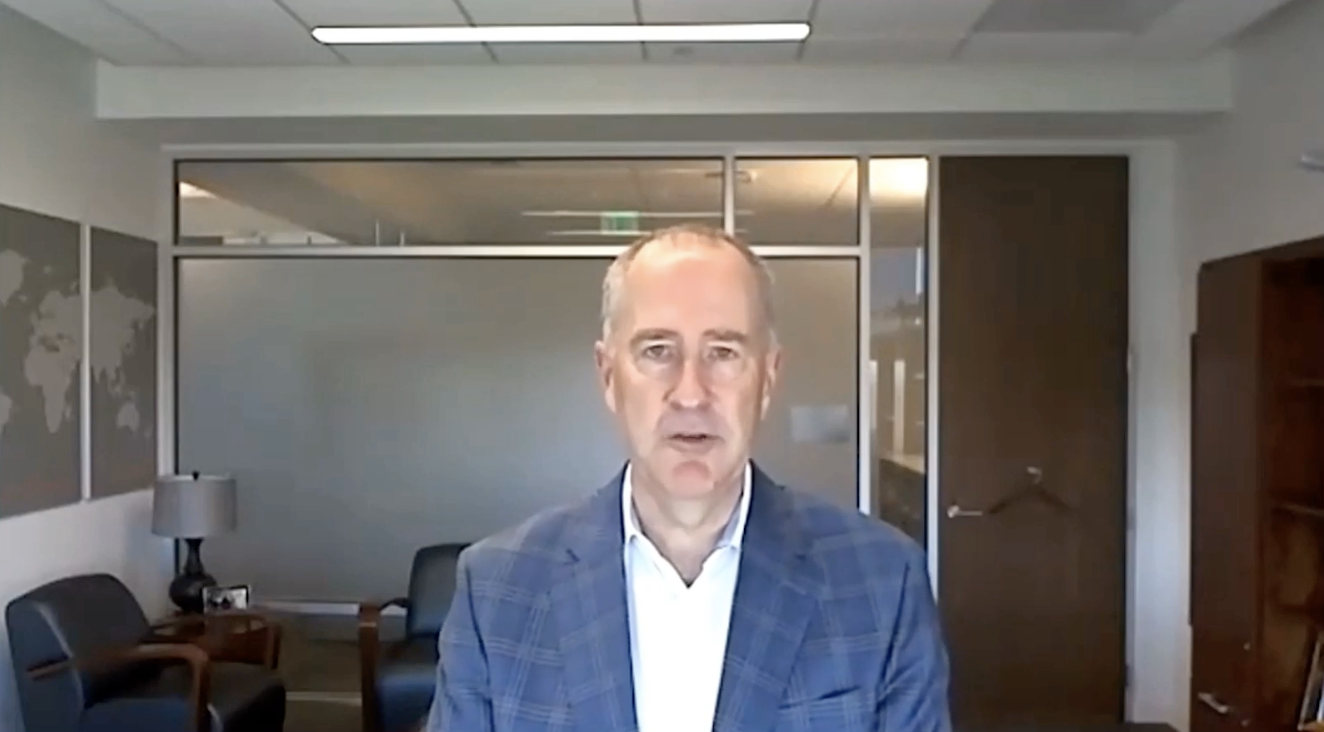USA. In an encouraging signal of hope for the return of air travel in the Americas, Dallas Fort Worth International Airport CEO Sean Donohue has said the company is aiming to hit 80% of pre-crisis domestic traffic this Summer and to reach 2019 levels by early 2022.
That was one of many key messages from a compelling and inspiring interview with Donohue at the Summit of the Americas today (full video below), in which he also reiterated the airport’s strong support for concessionaires. As reported, Dallas Fort Worth International has extended the contracts of F&B, retail and services concessionaires across 226 locations by two further years in response to the COVID-19 pandemic.

Addressing the potential recovery, Donohue said: “Short term we’re preparing for this Summer to be at about 80% of Summer 2019 when it comes to domestic travel. That is going to predominantly be leisure travel and people visiting friends and family. We believe, as we enter Spring 2022 we will probably be back to about 100% of our domestic travel. But the question is, when will international come back and we believe that might be towards 2023.”
On support for concession partners, Donohue said it made sense to build back with partners that not only survive the crisis, but are in a position to support the airport’s growth.
“As we look out over the next couple of years, we don’t anticipate being able to launch as many RFPs as we normally would. We are not sure our concessionaire partners will have the capital to put into new programmes and we need to recognise that and be sensitive to it. That’s why we have added two years of terms to all our concessionaire contracts.
“One of the reasons we’ve offered this financial support to our concessionaire partners is when the traffic does come back, we want them to be in a place where they can serve our customers. When I go to airports, and I only see a handful of concessionaires open, what I start to ask is when the recovery happens, will those concessionaires be there to help?
“If we do get to the 80% of our traffic this summer, our belief is the majority of concessionaires will be open and they will be able to serve our customers and that is a positive part of the recovery.”

Among other support measures, the airport is extending the suspension of Minimum Annual Guarantees by six months through to 30 September 2021. For some leases, the airport will also delay percentage rent escalation by two years to 30 September 2023. In addition the board approved a waiver of all operating & maintenance and storage fees from 1 March 2021 to 30 September 2021.
“I find that there’s a spirit to travel. I find that people like to make that connection and although it will take a little while to recover, we’ve got to continue working with all of our business partners and concessionaires to help them until the recovery takes full effect.”
As reported, Dallas Fort Worth International was among the first airports in North America to respond to concessionaires’ calls for relief when the COVID-19 crisis struck. In early April 2020 its board ratified a crucial plan to move commercial partners from MAG-based fee models to a rent structure based on a percentage of sales.
It also allowed concessionaires struggling amid the COVID-19 crisis to relinquish space without penalties or repercussions for their existing leases – an initiative also extended this month through to 30 September.
With the extension of these relief measures, by September the airport will have provided its concessionaires with US$120 million of financial support.
While some capital projects have been put on hold, Dallas Fort Worth International is to renovate Terminal C, the only terminal that has not been upgraded in recent years, added Donohue. Terminal C mainly serves American Airlines domestic flights.
On how aviation more broadly will shape up post-crisis, Donohue said: “There is a great debate going on over here about what is going to happen with hubs versus point-to-point traffic. There are some people who are saying that because of the pandemic, hubs might suffer because people don’t want to connect and they would rather fly point to point, meaning less contact with people. I don’t agree with that though.
“Customer behaviour is primarily driven by price and I don’t see that changing. If you can connect through DFW for US$50 cheaper than a non-stop flight most people will choose the connection. I believe hubs are going to become even stronger, as we all recover economically and in different phases, and also airlines are going to be very risk-averse coming out of this pandemic. DFW and other hubs that have strong carrier service are actually going to recover faster from this pandemic.”
On how DFW Airport has adapted, Donohue said: “I couldn’t be prouder of the employees at DFW during this past year. They’ve been incredibly resilient and flexible. In terms of our concessionaire partners [DFW commercial chiefs] Ken Buchanan and Zenola Campbell have just done a fantastic job not only supporting them but communicating with them, sharing information, listening to them. And that example has permeated throughout the organisation.
“I made the decision early on that I would not furlough any employee, I would not reduce pay, I would not reduce benefits. And they have responded to that by doing a great job. We’ve transitioned a lot of employees to work virtually and that has worked better than we thought it would.
“But we are an airport and two thirds of our employees have to show up here every day. And we’re hoping over the next couple of months will start to be able to bring some of our employees back on to the campus who have been working virtually. And then finally we are going to have to figure out what is the future and do we have to be more flexible? Working virtually has proven to be successful so how do we strike that balance between getting people together and back into the workplace, because there is a value to that. But we also must recognise that we probably have to be a little bit more flexible with allowing people to work virtually.”
Offering a wider message to the industry, Donohue said: “This crisis is the single biggest disruption to the aviation industry we have ever seen in modern history, unquestionably, and it has had a significant impact both professionally and personally on people. That is why our focus has been on trying to support our employees and support our business partners.
“But I am optimistic about the recovery. I find that there’s a spirit to travel. I find that people like to make that connection and although it will take a little while to recover, we’ve got to continue working with all of our business partners and concessionaires to help them until the recovery takes full effect. I believe the recovery will take full effect sooner at DFW and that’s a good thing for our partners.
“Travel and tourism accounts for 10% of global GDP. It is an incredible amount of jobs, an incredible economic engine and, that spirit of travel, combined with the economic impact, is going to carry the day.”













